
ABOUT SCOTT FRANKLAND
Scott Frankland is Head of Content at Sengerio. His spirit of inquiry leads him to the world of transportation and mobility to connect with the industry’s leading experts and shine a light on the hot topics.

San Francisco’s Bay Area is renowned for its status as a hub for the leading tech companies, which seemingly evokes a competitive nature between the tech giants that want to attract and retain the world’s finest talent.
Over the past years, a substantial investment has been strategically put into employee transportation, as commuter programs in general have a strong correlation with employee satisfaction.
It has become well-known that a comfortable and cost-saving ride to and from the workplace ultimately supports and reinforces talent retention and productivity at the office.
Not only that, encouraging employees to adopt more sustainable means of getting to work means a great reduction of one’s carbon footprint and the reduction of local traffic and congestion.
The biotechnology giant Genentech has notably been recognized as a pioneer in the eyes of the world of employee transportation for their award-winning sustainability commuter program at their headquarters in South San Francisco that started back in 2006.
This article explores the evolution of Genentech’s cutting-edge commuter program, gRide.
In addition, Sengerio connects with Andy Jefferson, Director of Transportation for Site Services at Genentech and head of gRide, to learn more about Genentech’s award-winning commuter program; including the company’s recent advances towards fleet electrification and the company’s continuous support for the local community.
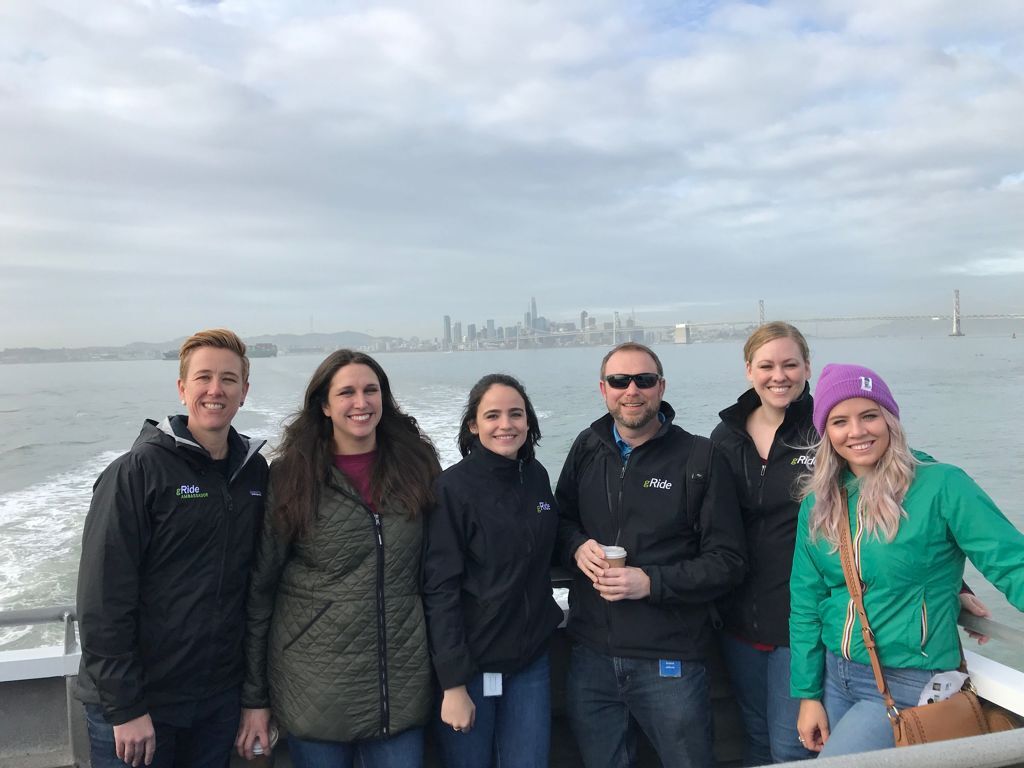
Widely considered one of the founders of the biotechnology industry, Genentech has become known for delivering outstanding scientific advancements for more than 40 years.
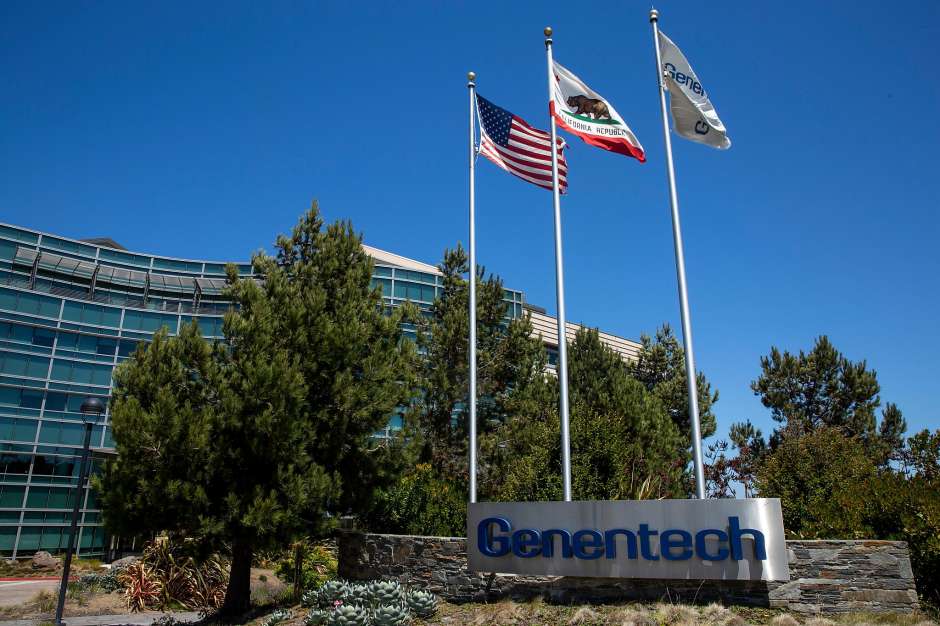
Aside from their scientific success, Genentech, one of San Francisco’s largest employers, has been recognized by the world of transportation for establishing an extensive transportation network of shared and sustainable commute possibilities for over 12,000 on-site employees each day via their commuter program known as gRide.
Back in late 2006, the program was initially proposed during the construction of Genentech’s headquarters after making an agreement with the city of South San Francisco calling for transportation options to reduce the rate of single occupancy vehicles (SOVs) which requires costly infrastructure for parking and roads. Consider that a report found the average cost across twelve U.S. cities to build a single parking space to be $24,000.
It is for this reason that the company wanted to implement a transportation demand management system (TDM). That is, to apply strategies, policies, and resources to reduce the need for employees to come to work in SOVs by providing alternative modes of transportation (e.g. Carpool, vanpool, bus, transit). TDM programs are cost effective, sustainable, and transform employee’s commute time into productive work time.
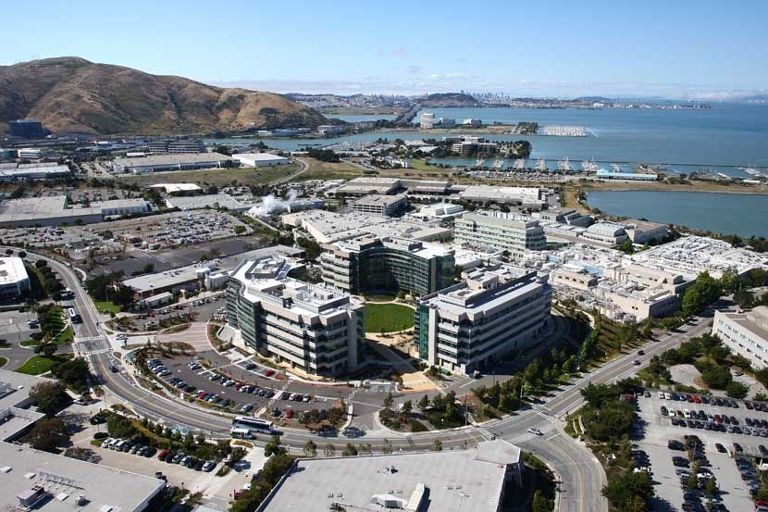
Today, the program includes providing mobility services such as GenenBus, transit connector buses, rideshare, Genentech ferries, vanpools, carpools, public transit reimbursements, and incentives for employees who bike/walk to work, throughout the nine counties of the San Francisco Bay Area.
To encourage employees to adopt the program, the company had initially implemented financial incentives for their employees to shift their transport modalities and not use SOVs which would enable Genentech to avoid building more parking spaces on campus.
This is because Genentech represented a notable case where it is the company itself who is the tenant and in charge of the developing. Therefore, the company avoided any possible concerns or issues a developer would have had with reducing parking space.
Typically, a third-party developer would be concerned about reducing parking space because in the future, a different business may wish to lease the space.
The company’s initial objective was that by the end of the first 3-year period to achieve a minimum of a 30% modal shift of their employees from their personal vehicles to gRide.
For this, an independent survey was required to be carried out every 3 years to ensure the objective is being satisfied and avoid risking penalties from the local authority — the City of San Francisco.
One of the more distinguished mobility options of the gRide program is the coach shuttle service GenenBus.
Notable for its glamorous buses and services stretching across all the counties of the Bay Area, prior to the pandemic Genenbus transported around 2,500 employees daily.
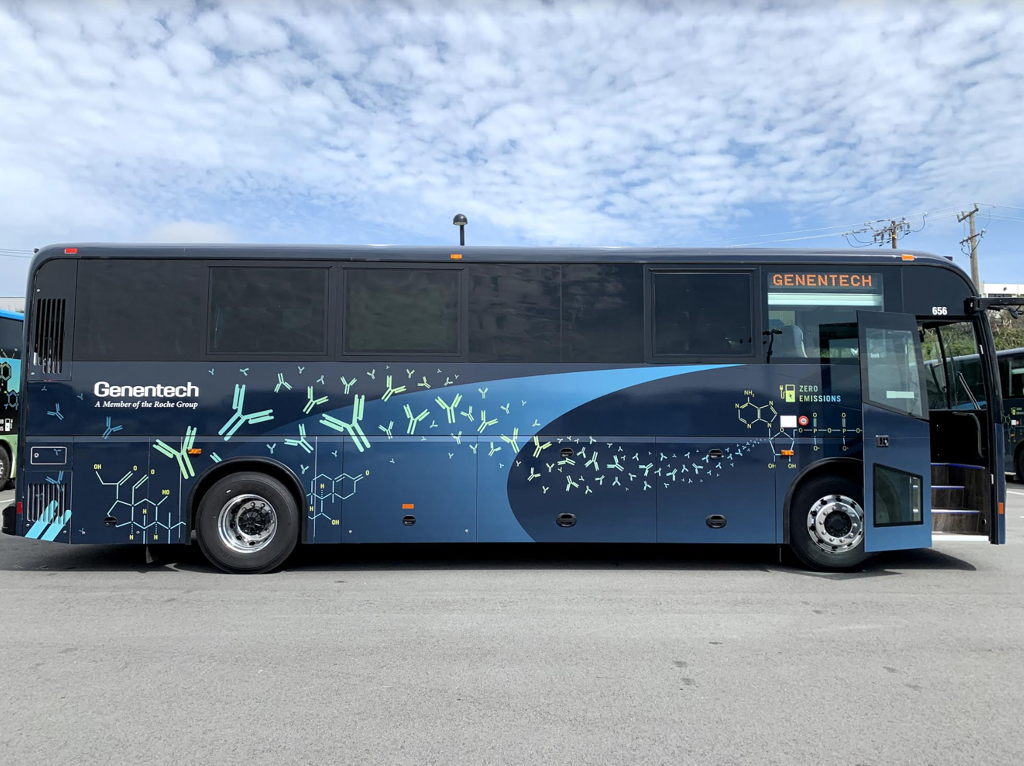
Genentech’s innovative program uncovered additional funding sources by partnering with neighbouring tech companies and sharing their shuttle operations in addition to also providing BART/Caltrain “last-mile” services to the major public transit stations of the area.
While the company has collaborated with several transport companies over the years and began the program with 5 vehicles to serve connections with train stations, Genentech currently contracts the bus operator WeDriveU to perform the necessary services. It is this operator who provides a local management team and the driver workforce.
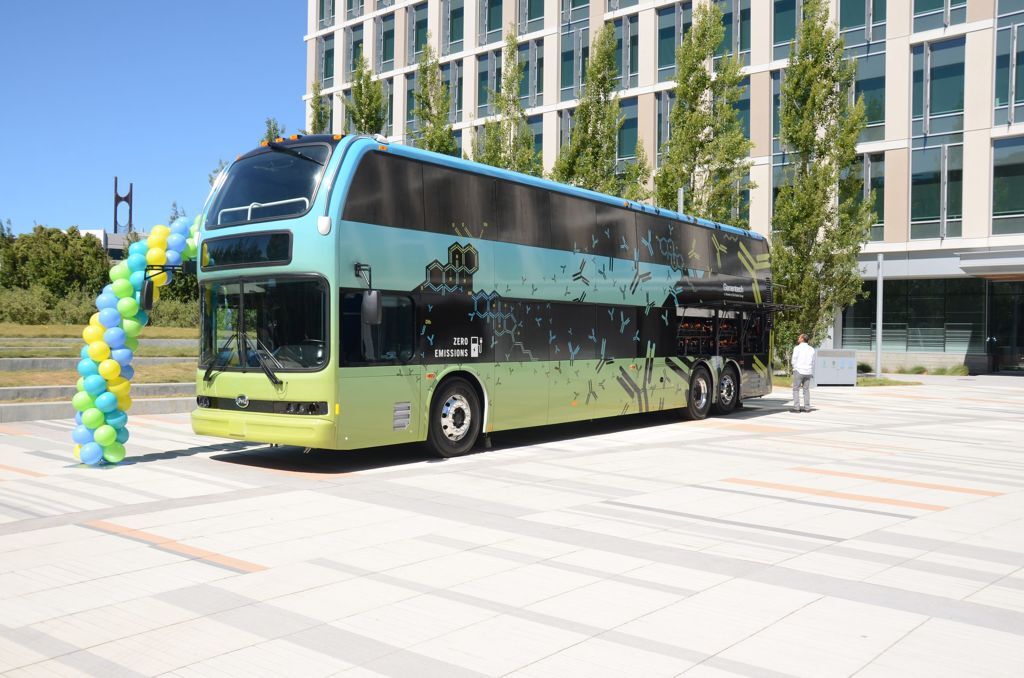
Once the comprehensive program was set, the next step consisted of implementing incentives for the employees to take on the program and reach the initial milestone of a 26% modal shift. In order to do this, it was key to survey the employees in order to understand what they value most in such a program.
Initially, the incentives Genentech provided consisted of cash rewards for employees using any of mobility options associated with gRide.The company now provides full reimbursement for any employee commute transportation expense and incentives for low-impact commutes (eg: biking and walking), but no financial incentives for use of the private GenenBus service. That’s because the company found it isn’t necessary, as Andy Jefferson explains:
We discovered that people want to ride the bus. We have very intense traffic and congestion in the Bay Area, so people want to ride the bus so that they don’t have to sit there in traffic.
They can get on a comfortable bus that has Wi-Fi and do whatever they want to do with their time.
By 2013, gRide had increased their number of GenenBuses to a total of 38 and were serving 27 commuter routes with over 3,500 riders per day.
Not only did >40% of their employees daily participate in gRide, an enormous 4.5 million trips had been eliminated since 2006; saving 3.6 million gallons of gas and reducing CO2 emissions by 70 million pounds.
After passing a major milestone, their program received the Metropolitan Transportation Commission’s Merit Award for Outstanding Commute Program and was recognized as an innovator among peer companies and public agencies.
The workforce certainly seemed to be excelling too, as Genentech was also awarded:
In 2019, Genentech became part of the Climate Group’s EV100 initiative that brings together companies committed to changing their fleets to electric vehicles by 2030.
As an EV100 member, Genentech strives to convert its fleet, including the 60 Genenbus coaches and over 1,300 sales vehicles, to electric vehicles or plug-in hybrids.
In addition, the company plans to convert its 12 onsite shuttles which are currently powered by gasoline whilst also continuing to expand its charging facilities for the employees.
Prior to signing on to the EV100 initiative, Genentech had already acquired several electric coaches made by a Chinese firm with Californian-based headquarters known as BYD back in 2018, who were the only manufacturer that could supply an industrial amount of electric commuter buses in the United States at that time.
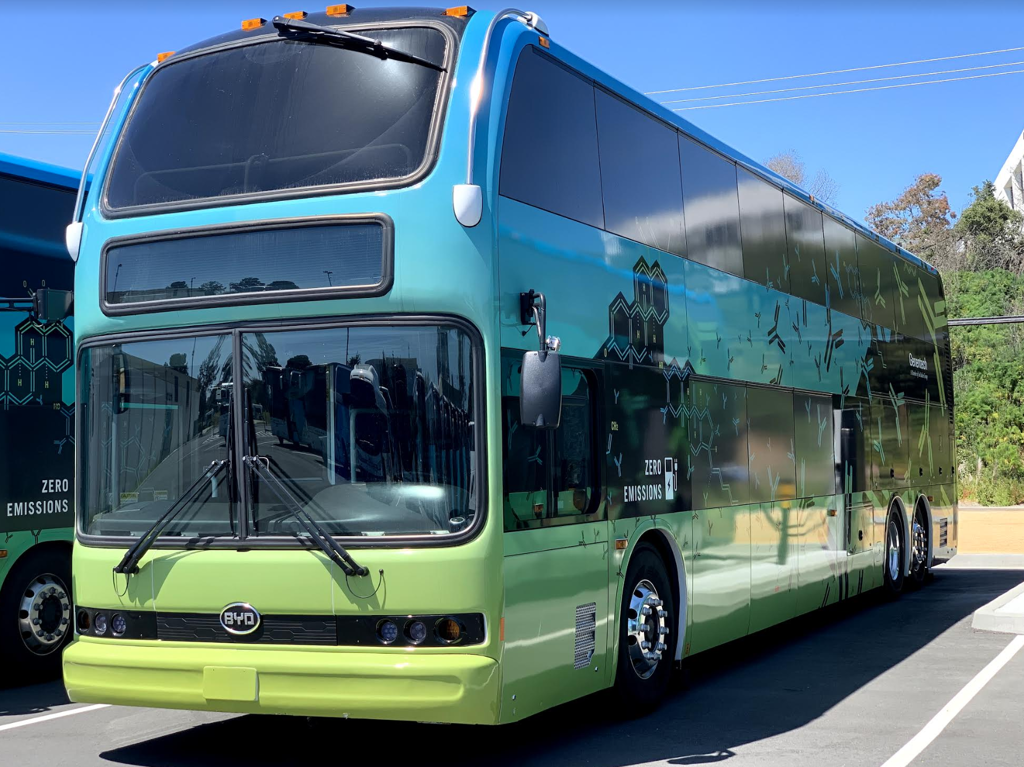
Today, over a third of the Genenbus fleet is electric. Content with the progress of the program, Andy Jefferson told Sengerio that:
We are happy with the buses; they are working extremely well.
We are also looking forward to experimenting with other bus models that are coming out on the market. We are testing one right now and we have already selected those that we will be testing in the near future.
It’s how we approach things. We want to see what’s out there that we want to test. We aim to partner with these companies to help them improve their products.
The pioneering move by Genentech was among the first of its kind within the area.
To their merit, Genentech was mentioned by GreenBiz among a superior list of the Top 25 Most Sustainable Fleets, stating that:
Other tech companies have been rather hesitant in adopting electric vehicles, primarily due to the complex adaptation infrastructure needs in order to accommodate the changes.
For instance, consider the elaborate infrastructure needed to charge and fuel electric fleets — it requires intricate planning and a management strategy that establishes collaborations with local utilities.
However, Genentech already had the space available. Thanks to their strategic planning several years ago, the necessary electrical equipment was already implanted under the lot so that when the time came to electrify, they just needed to pull the wires through and connect the charging stations.
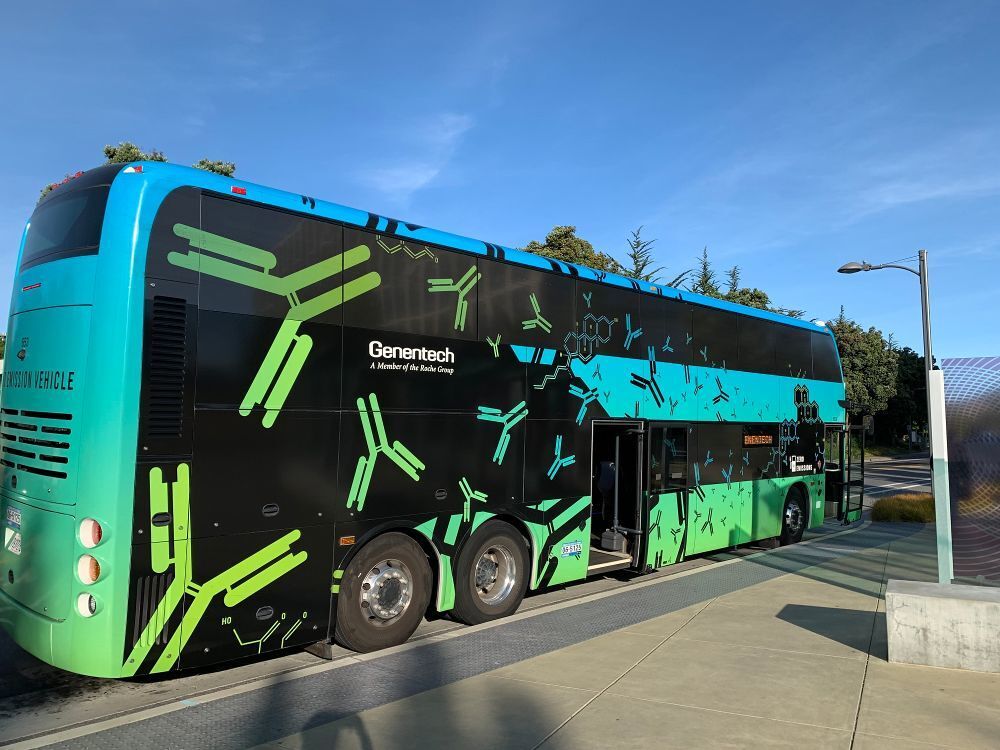
In order to support their project, Genentech collaborated with Pacific Gas & Electric to calculate the required power to run their program and also set up a new transformer to charge their electric fleet.
Moreover, substantial investment has also been implemented to train the drivers to use electric vehicles and the IT systems utilized to manage the program.
The transport department at Genentech are currently focusing on creating a charge management software-hardware combination in order to establish a platform that allows remote charging.
This means that the management team can remotely understand which buses are available and which need charging.
In addition, it won’t be necessary for personnel to physically plug-in the buses that need charging, they will simply plug-in the buses after each use and the management team relays all the essential information.
In combination with their on-site technical upgrades, Genentech retains their full commitment in supporting South San Francisco and local infrastructures by including a contribution of at least $250 million for specific projects designed to address community needs.
This includes providing a “Trip Cap” and limiting the number of vehicles arriving at their headquarters each morning during rush hour in order to minimize congestion.
More recently, Genentech began helping school students during the pandemic that don’t have an efficient internet connection to study from home whilst the schools are closed. The program consists of the company providing one of its vehicles to various schools for the day where students can work using the vehicle’s WiFi connection in a safe manner.
Genentech undoubtedly has one of the most robust commuter programs to date and has rightly attained its status as a pioneer in the eyes of the transportation sector.
The company’s next milestone will be converting 80% of their fleet to electric by 2025, which puts them easily on target to succeed in their EV100 initiative.
Aside from their fleet, 2021 poses the new challenge of supporting their employees in the transition back to the workplace. Given that most of gRide’s programs are currently closed because of the pandemic, the next aim is to begin reopening them. As Andy Jefferson highlights:
[The employees] have become comfortable using their personal vehicles again so we need to reopen our programs in a way that’s safe to encourage them to use them again — always with the aim of reducing traffic, congestion, and greenhouse gas emissions.
In the meantime, Genentech will continue to work closely with the neighbouring companies in the business district to share their transportation program — such as making the empty seats on their buses available to the other companies at a cost.
The last mile services to and from the local train stations have also been made available for the other neighbouring companies and once gRide’s ferry service has reopened, the company hopes to make this service available too.

ABOUT SCOTT FRANKLAND
Scott Frankland is Head of Content at Sengerio. His spirit of inquiry leads him to the world of transportation and mobility to connect with the industry’s leading experts and shine a light on the hot topics.